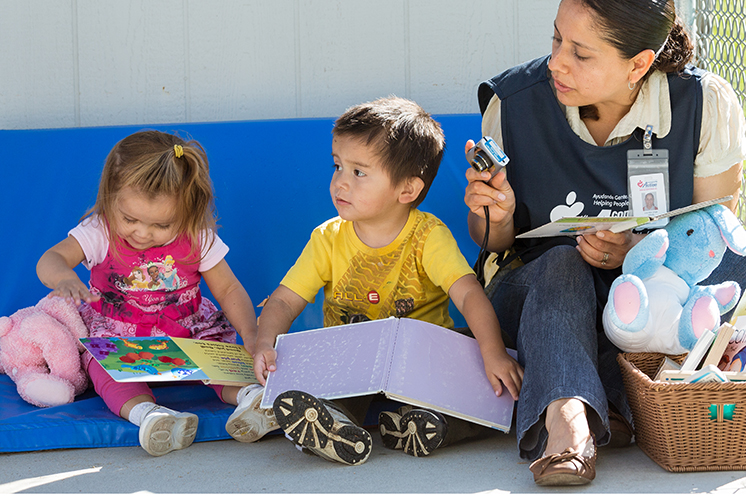 Assessment is the ongoing process of gathering information to monitor progress and make decisions. Assessment information can be used for screening, determining eligibility for specialized services, individualized planning, and measuring child outcomes. Learn more about recommended practices related to assessment from the Division for Early Childhood (DEC).
Assessment is the ongoing process of gathering information to monitor progress and make decisions. Assessment information can be used for screening, determining eligibility for specialized services, individualized planning, and measuring child outcomes. Learn more about recommended practices related to assessment from the Division for Early Childhood (DEC).
Resources for each topic area are organized based on their level of impact for learning. The resources provided are only a sampling of the resources available on these practices.
Knowledge Awareness Level
Resources that fall into this category provide basic information and do not include activities that draw participants in to respond or reflect. They include archived webinar recordings and checklists.
Developmental Screening: Child Development—Learn the Signs. Act Early.
Screening for potential developmental delays in children allows for early treatment and supportive services. On the Centers for Disease Control and Prevention (CDC) website, Head Start educators and families will find a number of resources on developmental screening tools.
Developmental Screenings and Assessment Instruments with an Emphasis on Social and Emotional Development for Young Children Ages Birth through Five [PDF, 1MB]
Find a list of screening and assessment instruments that focus on multiple developmental domains, including the social and emotional development domain. Each instrument offers a description of the measure, age range, time to administer, scoring procedure, psychometric properties, and requirements for administrators.
Effective Instruction: Ongoing Assessment
This Disabilities Dialogue webinar offers tips and tools that disabilities coordinators, staff, and others in the early childhood community can use when working with children with disabilities. Listen as guest experts share resources to support children with disabilities and their families.
Family Engagement and Ongoing Child Assessment
Explore strategies and consider the responsibilities and perspectives of parents and program staff related to sharing information. Find ways for programs to partner with families to support children's learning and to enhance relationships between staff and families.
Follow-up Checklist: When a Child Is Identified with a Permanent Hearing Loss
This checklist can be used by program staff, teachers, and parents to help support an infant or toddler who has been identified with permanent hearing loss. It addresses the areas of medical and audiological practices, early intervention, and family support follow-up.
Using the ELOF to Inform Assessment
In Head Start programs, child assessment instruments must be aligned with the Head Start Early Learning Outcomes Framework (ELOF). This implementation guide includes information on aligning child assessment instruments with the ELOF and considerations for selecting assessment tools for children with disabilities. Learn more about making informed decisions about keeping, supplementing, or replacing an assessment instrument.
Knowledge Acquisition Level
The resources below provide useful information and activities that draw participants in to respond or reflect.
Assessment Checklists and Practice Guides for Practitioners and Families
Learn more about the DEC Recommended Practices topic area of assessment. Checklists address informed clinical reasoning, engaging families as partners in their child's assessment, authentic child assessment practices, and building on child-strengths practices. Practice Guide topics for practitioners include Authentic Child Assessment, Building on Child Strengths, and Engaging Families as Assessment Partners. Family-oriented Practice Guides include Building on My Child's Strengths, Everyday Child-and-Family Activities, and Seeing My Child's Strengths. The guides include downloadable materials, video examples, and links to additional resources.
Break It Down: Turning Goals into Everyday Teaching Opportunities
Watch a short video that shows how to break down children’s learning goals into smaller parts to make teaching and learning easier and more manageable. Links to supporting materials are provided, including tips, tools, and resources for teachers, supervisors, and trainers.
Knowledge Application Level
Milestone Tracker Mobile App
Download the CDC's app to track your child's milestones from age 2 months to 5 years. Find tips to facilitate your child's development and helpful resources for when you have concerns.
Mastery Level
Review resources coaches, faculty, and professional development providers can use to teach content and support others in developing related knowledge and skills.
Break It Down: Turning Goals into Everyday Teaching Opportunities
Watch a short video that shows how to break down children’s learning goals into smaller parts to make teaching and learning easier and more manageable. Links to supporting materials are provided, including tips, tools, and resources for teachers, supervisors, and trainers.
Ongoing Child Assessment: Overview
Check out this 15-minute In-service Suite about ongoing child assessment. Trainers can review the presentation notes and slides to guide participants in the learning activities around gathering child assessment information and using data to support children, especially those with disabilities, and their families.
Planning for Assessment
Find out how teachers can plan for ongoing assessment of children's learning in preschool classrooms. Use the Assessment Tracking Chart to keep track of the information collected. Discover tips, tools, and resources for teachers, supervisors, and trainers.
Tools for Supervisors: Assessment Review Form
Use this form to observe teachers who are engaged in child assessment activities in the classroom. The information collected can help supervisors provide feedback on what the teacher did well and suggestions for improvement.
Tools for Supervisors: Interpretation Form
Help teachers interpret the information they learn from anecdotal records. Supervisors can use this form to gather information about how teachers use data they collect to improve children's learning or how supervision can be used to guide staff in their decision-making.
Using Checklists
Learn simple ways teachers can develop and use checklists to collect data on child progress. Find tips, tools, and resources for teachers, supervisors, and trainers. Review the sample and use the blank Skill Assessment Checklist to document children's progress on specific skills, like expressive language.
« Go to Resources Supporting Individualization
Read more:
Resource Type: Article
National Centers: Early Childhood Development, Teaching and Learning
Audience: Teachers and Caregivers
Last Updated: May 29, 2024
